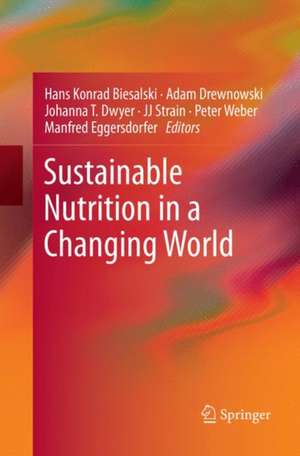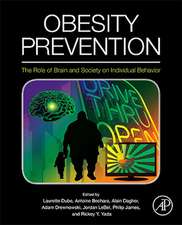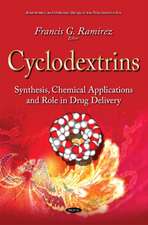Sustainable Nutrition in a Changing World
Editat de Hans Konrad Biesalski, Adam Drewnowski, Johanna T. Dwyer, JJ Strain, Peter Weber, Manfred Eggersdorferen Limba Engleză Paperback – 2 aug 2018
| Toate formatele și edițiile | Preț | Express |
|---|---|---|
| Paperback (1) | 866.15 lei 38-44 zile | |
| Springer International Publishing – 2 aug 2018 | 866.15 lei 38-44 zile | |
| Hardback (1) | 1297.62 lei 6-8 săpt. | |
| Springer International Publishing – 28 iul 2017 | 1297.62 lei 6-8 săpt. |
Preț: 866.15 lei
Preț vechi: 911.74 lei
-5% Nou
Puncte Express: 1299
Preț estimativ în valută:
165.75€ • 172.00$ • 138.54£
165.75€ • 172.00$ • 138.54£
Carte tipărită la comandă
Livrare economică 14-20 martie
Preluare comenzi: 021 569.72.76
Specificații
ISBN-13: 9783319857855
ISBN-10: 3319857851
Pagini: 406
Ilustrații: XVI, 406 p. 40 illus., 29 illus. in color.
Dimensiuni: 155 x 235 mm
Ediția:Softcover reprint of the original 1st ed. 2017
Editura: Springer International Publishing
Colecția Springer
Locul publicării:Cham, Switzerland
ISBN-10: 3319857851
Pagini: 406
Ilustrații: XVI, 406 p. 40 illus., 29 illus. in color.
Dimensiuni: 155 x 235 mm
Ediția:Softcover reprint of the original 1st ed. 2017
Editura: Springer International Publishing
Colecția Springer
Locul publicării:Cham, Switzerland
Cuprins
From the Contents: Introduction.- Food and Nutrition Security.- Sustainable healthy diets: Models and measures.- Measurements of food insecurity.- Modeling of Sustainable Nutrition Security.- Nutrition security in older adults - status quo and future development.- Rationale for a combination of selected micronutrients to improve cognition and prevent or slow down age related cognitive impairment.- Food insecurity and poverty in Germany.- Meat consumption and Sustainability – How is a change of consumer behavior possible?.- Food Insecurity: Determinants and Impacts.- Sustainable micronutrients in Europe – any concern?.- Micronutrient status in affluent societies.- B-Vitamins.- Iron and Zinc: Two Principal Trace Element Nutrientsin the Context of Food Security Transitions.- Iodine deficiency: achievements and challenges for the 21st century.- Adequate protein in Nutrition – arguments for more or less ?.- Malnutrition – consequences for clinical outcome.- Introduction: Assuring Food & Nutrition Security in Affluent Societies.- Working Title: The Food Industry as a partner for Public Health?.- The challenge: Improving Food & Nutrition Security in Affluent Societies - A Food Ingredient Provider Perspective.- Food & Nutrition Security: A Consumer Perspective.- Food chain processes and food quality.- Formulating Food Ingredients for different Applications: Some examples.- Stability of vitamins A and E in edible oils.- The Search for the Optimal Macronutrient Recommendation and Nutrition Security.- Getting Enough Protein for the Growing World Population.- Nutrient density an important concept to assure food and nutrition security in modern societies.- Does it work? Is it worth it? Evaluating the costs and benefits of nutritional interventions.- Approaches to secure food and nutrition security in the elderly.- The Role of Food Fortification – Example Folate.- Role of Fortification and Dietary Supplements In Affluent Countries: Challenges and Opportunities.
Notă biografică
H. K. Biesalski is head of the department of biochemistry and nutrition and managing director of the Food Security Center at the University of Hohenheim, Germany. He is a member of numerous advisory and expert groups for the World Health Organization (WHO), the Food and Agriculture Organization (FAO) and the Global Forum on Food Security and Nutrition. Adam Drewnowski is a world-renowned leader in the prevention and treatment of obesity. He is Professor of Epidemiology and the Director of the Center for Public Health Nutrition at the School of Public Health. He is also the Director of the University of Washington Center for Obesity Research, which addresses the environmental, social and economic aspects of the obesity epidemic. Adam Drewnowski is Adjunct Professor of Medicine and is a Joint Member of the Fred Hutchinson Cancer Research Center in Seattle.
Textul de pe ultima copertă
This book is the first of its kind to tackle in detail the nutritional requirements of the industrialized, so-called developed world. It discusses the link between socio-economic status and food security, focusing especially on the relationship between income and food security in different age groups. The authors calculate the actual levels of essential micronutrients delivered by current dietary patterns, identifying important shortfalls in the provision of key micronutrients, and elucidate the public health consequences of nutrition insecurity. Finally, the authors discuss future approaches for ensuring nutrition security on the basis of three pillars: access, availability and nutritional value. The approaches advocated in this ground-breaking publication will allow all people, irrespective of age and social status, to have access to a safe and nutritious diet. Key stakeholders such as legislators, government, academia and industry, as well as consumers themselves, all have important roles to play in making this a reality.
Caracteristici
First book-length treatment of this critical topic Written by a carefully selected panel of international experts Serves to guide future research and development of policies Includes supplementary material: sn.pub/extras














